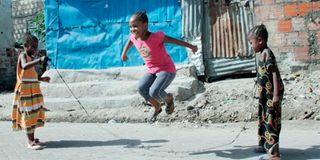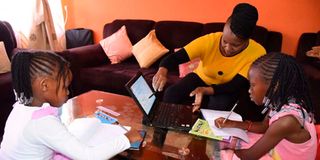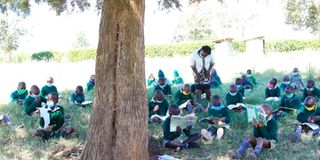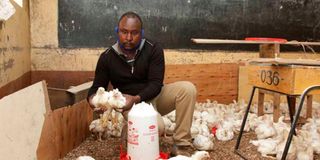
Students going home from school.
| File | Nation Media GroupEducation
Premium
How the ‘lost’ academic year changed lives of thousands
On this day one year ago — March 15, 2020 — all Kenyan schools shut their doors to learners and did not reopen until six months later.
A year after the Covid-19 pandemic hit the country, the education sector is still struggling to get back the “lost” academic year.
The pandemic upset the education calendar, making 2020 the most challenging year in recent times for learners, teachers, parents and all other education stakeholders.
Ministry of Education Principal Secretary for Basic Education Julius Jwan said the government had learnt valuable lessons from the pandemic that will inform future policy changes.
“The education sector, in collaboration with the Ministry of Health and other education stakeholders, has developed and published the Kenya Basic Education Emergency Response Plan 2020 that aims to ensure continued learning and promote health, safety and wellbeing of learners, teachers and education officials during and post the corona crisis,” Dr Jwan said Sunday in an interview.

Children play outside their house in Tudor, Mombasa as they stayed out of school due to Covid-19.
Caught napping
The government has faced accusations that it was caught napping and did not have a coordinated response to the crisis. But Dr Jwan terms Covid-19 as an unprecedented pandemic, especially its magnitude.
“No education system had any preparation in place. The right decisions were made to protect teachers and learners and the reopening was both strategic and timely,” he said Sunday.
As most learners in private schools and colleges almost seamlessly switched to online classes, Covid-19 exposed the big class divide in the country, reflected by total learning paralysis in public schools.
The Education Cabinet secretary, Prof George Magoha, declared that no learners would gain advantage over others through the online classes when it seemed like the more privileged, who could afford reliable internet connection and learning gadgets, were pulling ahead of the rest.
However, Dr Jwan said the government did not just watch as the public school learners went without classes. The Ministry of Education instituted several remote learning interventions, including provision of lessons and digital content through radio, television, the Kenya Education Cloud and online platforms.
Some of these learning interventions, including Zoom, webinars and the Kenya Education Cloud hosted at the Kenya Institute of Curriculum Development (KICD), will continue being part of government learning policy, he said.

A girl herds sheep and goats in Riongo village Tiaty in Baringo County on June 1, 2020 as schools remained closed due to the Covid-19 pandemic.
National exams
For the first time since the 8-4-4 curriculum was started in Kenya in 1985, learners did not sit their Kenya National Examination Council (Knec) exams at the end of the year.
The first case of Covid-19 was reported in Kenya on March 12, and President Uhuru Kenyatta closed schools three days later, on March 15.
Opening of schools was to be determined by the decreasing number of the Covid-19 cases in the country, and that took months to achieve.
The Kenya National Union of Teachers (Knut) secretary-general, Mr Wilson Sossion, said the government must take valuable lessons from the crisis and prepare for future pandemics.
For a start, he said, the government must ensure the laptop programme is implemented in schools to achieve the goal of digitising learning in public institutions.
“It is going to be difficult to address such future pandemics if the government will not invest in digitisation,” said Mr Sossion in an interview yesterday.
He accused the Jubilee government of failing to keep its promise on digital learning in public schools, which was a key campaign promise.

Tasha Wambui Wakaba (left) and her sister Faith Nyaucha Wakaba doing their class assignments with the help of the mother Ann Kiboi Wakaba in April 2020. Online classes were introduced after schools closed due to Covid-19.
Vaccinate all teachers
“Going forward, it is necessary for the government to plan on how to vaccinate all teachers and school-going children to ensure education continues uninterrupted,” he said.
The pandemic caught schools, especially learners, teachers, the Education ministry, education stakeholders, parents and the government by surprise.
More than 15 million learners in public schools could not access classes during the shutdown.
Due to the long break, a large number of pupils and students is reported to have engaged in drug abuse and pre-marital sex, leading to thousands of teenage pregnancies. In October, more than 20 students were found by the police in a house in Nairobi taking alcohol and having sex. Such scenes were replicated in various places around the country.
In an effort to salvage the ‘lost’ year and save learners from repeating classes, Prof Magoha appointed a Covid-19 National Education Response Committee to advise on reopening of schools.
The committee was also mandated to review and organise the school calendar as part of the Covid-19 post-recovery strategy.
Several proposals, including phased schools’ reopening, were raised after a move to engage learners in community-based learning in September was stopped by the court.

Pupils learning under a tree after schools reopened in January 2021 after a long break occasioned by the Covid-19 pandemic.
Phased reopening
The task force later agreed to open schools in two phases.
Candidate classes of Grade 4, Standard 8 and Form Four went back to school on October 12, while the rest reported back in January this year.
The revised 2020 to 2023 school calendar will see learners engage in a crash programme. Primary and secondary school learners will have a two-year packed school calendar, with the normal schedule expected to resume in January 2023.
Knec also revised the exam timetables for the 2020 KCPE and the KCSE examinations. The KCPE examinations had earlier been scheduled to start on November 2 and run for three days, while the KCSE exams were to start on November 9 and end on November 30.
Standard Eight candidates are now scheduled to start their exams on Monday, March 22 and finish on March 24, while Form Four candidates will sit for their written examinations from March 26 to April 2. Practical exams started on Monday last week.

Lincoln Njogu, director of Ndima Kanini Academy in Karatina, Nyeri County with chickens he was rearing inside one of the classrooms following the closure of schools due to Covid-19. A number of private schools were permanently closed due to the negative effects of the pandemic.
Suppliers affected
Education-related businesses such as suppliers, hostels, private colleges and schools were also hit hard.
Several bookshops, school uniform suppliers, publishers and hostels were shut down, with some opting to shift their focus to other businesses as the Covid-19 pandemic continued to impact the country’s economy negatively.
The investors and suppliers depended on schools, selling them uniforms, books, cereals, lab equipment, soap, among others.
Hostels, which majorly depend on university and college students, have also been struggling to get back to profitability, as most institutions of higher learning are still engaging in virtual lessons.
More than 339 private schools closed down permanently, affecting at least 56,000 learners, according to Kenya Private Schools Association chief executive Peter Ndoro.
The schools closed because they lacked the funds to prepare their institutions for safe reopening in line with the Ministry of Education's guidelines, while others were unable to pay rent.
Some of the schools turned to other businesses, while others have rented out their buildings for lack of finances to manage them.





